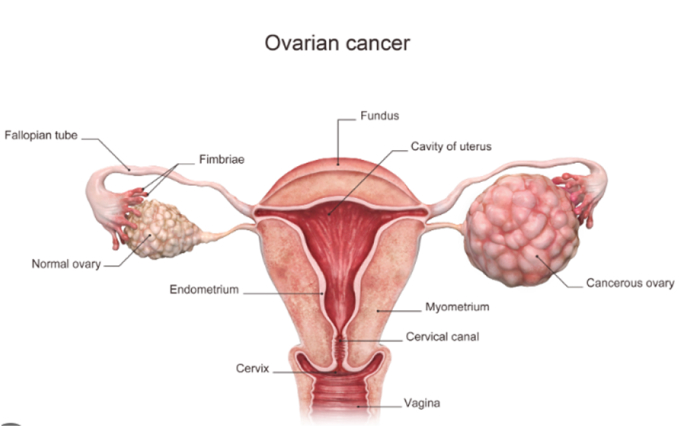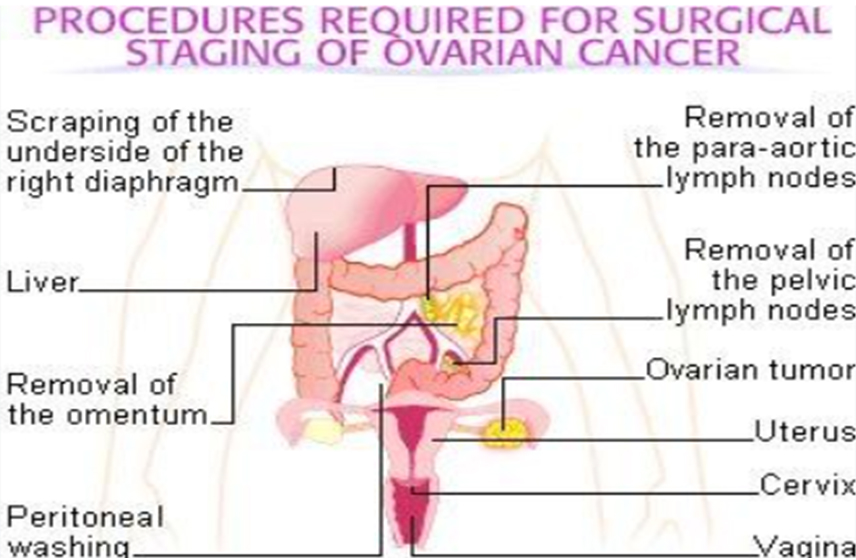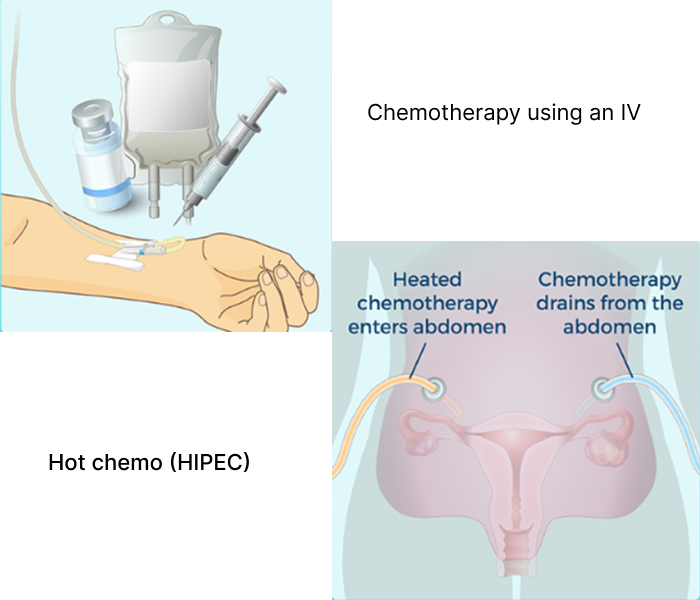Ovarian Cancer
- Home
- Ovarian cancer

Overview
What is Ovarian Cancer?

Ovarian epithelial cancer, fallopian tube cancer, and primary peritoneal cancer are usually formed in the same kind of tissue and all are treated the same way. The four most common histology types of epithelial ovarian cancers are serous, endometroid, clear cell and mucinous tumor. Other less common type of ovarian cancers include germ cell tumors of ovary which is commonly seen in young age group.
Ovarian epithelial and fallopian tube cancers are staged into early stage (Stage I and II) ovarian cancer where the tumor is confined to the site origin or confined to lower pelvis whereas advanced stage cancers include tumor that are spread beyond ovaries or fallopian tubes to involve other structures inside the abdomen (Stage III) or beyond the abdomen (Stage IV).
What are symptoms of Ovarian Cancer?
Ovarian cancer symptoms in its early stages are usually nonspecific, and hence it can be easily missed. As the tumor advances the presenting symptoms include
HOW DO WE DIAGNOSE CERVICAL CANCER?
It’s an office procedure in which a small brush is used to gently remove cells from the surface of cervix
What are the causes of Ovarian Cancer?
- Obesity
- Endometriosis
- Elderly age is the main risk factor.
- Family history of ovarian cancer in a first degree relative
- Inherited changes in BRCA1 or BRCA2 genes associated with family history of breast, uterine or colorectal cancer
- Hereditary conditions likes Lynch syndrome
How do we investigate?
- Physical examination
- Pelvic examination
- Ultrasound abdomen: to look for any abnormality in pelvis
- Chest X Ray
- CA 125 assay
- MRI Abdomen and pelvis : It gives a detailed pictures of the organ involved and also helps to know the extent of involvement of the disease inside the abdominal cavity
- PET CT : Its used to find out any spread in rest of the body
- Biopsy: usually done in advanced stage cancer prior to starting chemotherapy
How do we treat ovarian Cancers?
There are different types of treatment for patients with ovarian epithelial and fallopian tube cancers. The standard treatment includes
- Surgery
- Chemotherapy
- Targeted therapy
Other new types that are tested in treatment of ovarian cancers involves
- Immunotherapy
- HIPEC
Surgery
Usually surgery is advised for ovarian cancer in its early stage. In advanced ovarian cancers based on the extent of disease involvement, the treating surgeon decides on either an upfront surgery or will plan for upfront chemotherapy (Neoadjuvant chemo) followed by surgery.
Primary surgical staging involves removal of the uterus along with both ovaries, omentum, pelvic and abdominal nodal dissection with multiple peritoneal biopsies and wash cytology.
Interval debulking surgery is generally considered in advance stage disease when the patient is initially treated with chemotherapy and after a good response to chemotherapy they are taken up for surgery to remove the uterus with both ovaries and other involved tissues.
How do we treat ovarian Cancers?
There are different types of treatment for patients with ovarian epithelial and fallopian tube cancers. The standard treatment includes
Surgery
Chemotherapy
Targeted therapy
Other new types that are tested in treatment of ovarian cancers involves
Immunotherapy
HIPEC
SURGERY

Usually surgery is advised for ovarian cancer in its early stage. In advanced ovarian cancers based on the extent of disease involvement, the treating surgeon decides on either an upfront surgery or will plan for upfront chemotherapy (Neoadjuvant chemo) followed by surgery.
Primary surgical staging involves removal of the uterus along with both ovaries, omentum, pelvic and abdominal nodal dissection with multiple peritoneal biopsies and wash cytology.
Interval debulking surgery is generally considered in advance stage disease when the patient is initially treated with chemotherapy and after a good response to chemotherapy they are taken up for surgery to remove the uterus with both ovaries and other involved tissues.

Chemotherapy
It’s a use of drugs that acts against cancer cells and stops its further growth. The most common rout of administration is through vein where it enters the systemic circulation and can reach the cancer cells.
Intraperitoneal chemotherapy is a type of regional chemotherapy used to treat ovarian cancer, where the anticancer drugs are carried directly into the peritoneal cavity through a thin tube, the tube are placed inside the abdomen immediately after completion of surgery and the drug is administered through the tube once the patient completely recovers from surgery.
Hyperthermic intraperitoneal chemotherapy (HIPEC): It’s a treatment used during surgery after the surgeon has removed the tumor tissue. A heated chemotherapy is sent directly into the abdominal cavity and id circulated over a period of time.
Targeted therapy
There are different types of treatment for patients with ovarian epithelial and fallopian tube cancers. The standard treatment includes










